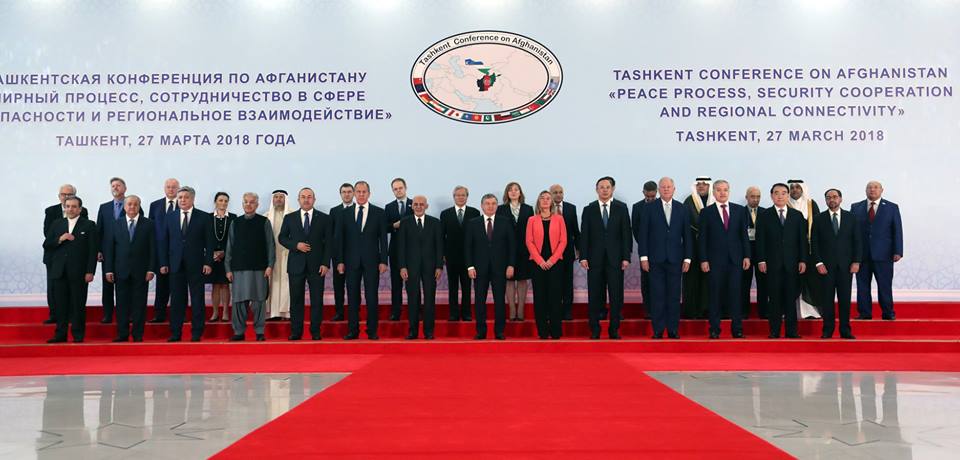The Tashkent Conference and Afghan Peace Success Factors
By Hekmatullah Zaland
Tashkent hosted an important international conference on Afghanistan last week. Besides Afghan and Uzbek presidents, the head of European Union Foreign Affairs, the representatives of more than 20 countries including U.S., U.K., Germany, Russian, China, France, Saudi Arabia, Iran, Pakistan, India, five Central Asian countries and international organizations had participated in this 2-day conference.
In his speech to this conference, President Ashraf Ghani once again emphasized on international and regional consensus on Afghan peace and security and asked the participants to back the inter-Afghan peace with the Taliban.
The Uzbek President Shavkat Mirziyoyev expressed his readiness for hosting face-to-face talks between the Afghan government and Taliban and told that the Afghan peace process is important to the entire region and thus, the joint goal of reaching to peace should take practical shape.
The participants, in their joint declaration, also supported the proposal of Afghan government on face-to-face peace talks with Taliban and they asked the Taliban to accept the proposal of Afghan government.
In this analysis, it is tried to answer the questions regarding the course of Afghan peace policy, the evaluation of new peace proposal of Afghan government and the success factors in the overall peace process.
The changing peace policy of Afghan government
The peace policy of the National Unity Government (NUG) has been focused on foreign policy in last three years and mostly it was tried to form regional and international consensus. Domestically, the Afghan government, instead of paving the way for peace and trust-building, tried to bring the Taliban to the negotiation table by using force, and it is something that was useless in last one and a half decade.
This policy of government was always victimized by security incidents and whenever there was a tiny development, this process was being stopped as result of another incident. The only successfulness of Afghanistan government in the process of its peace talks with the Taliban was the Murree talks; however, this process became stalled after the revelation of Mullah Mohammad Omar’s death.
It was for the first time, that changes in the government’s peace position comprehended in the second meeting of the Kabul process, and instead of insisting on force and fighting, it had a number of suggestions for initiating face-to-face peace talks with the Taliban. The latest meeting in Tashkent is also a first move of 1397 [solar year] on bringing peace and security in Afghanistan, and backing the proposal of second meeting of the Kabul Process is considered as one of the main goals of this conference.
Evaluation of Government’s Peace Proposal
In the second meeting of Kabul Process, President Ashraf Ghani announced the government’s new peace policy. This meeting became held only few days after several bloody attacks of Taliban on Kabul and in the time the government had previously boycotted the peace talks; and thus it was not expected that the government would show such an unprecedented plasticity in peace talks with Taliban.
The Afghan government’s proposal on face-to-face peace talks with Taliban was unexampled in last one and a half decade; because the government’s peace call was always translated into Taliban surrender in the past.
The government’s proposal to the Taliban in the second meeting of the Kabul Process was, to a large extent, called a practical step toward peace; however, the biggest challenge in it is that the fate of foreign forces in Afghanistan is not touched even slightly. It is something that is considered as the main factor behind Taliban fighting.
Overall, every peace-related effort brings hope and so this initiative of government has also brought hope for the successfulness of the peace process; however, it looks like the recent efforts of Afghan government would not have decisive results if the fundamental factors of war are not focused on. It is the reason why Taliban have not responded positively to the proposal of Afghan government by being silent.
Afghan Peace Success Factors
Nowadays it looks like the regional-level consensus on making peace with Taliban is at the peak more than every other time; yet, the success of Afghan government’s peace proposal is interlinked with following two factors:
First; Americans talks with Taliban: a day before Afghan government reveal its peace proposal to the Taliban, their open letter to American Congress and people show that the Taliban have absolute agreement on talks with the U.S. At this moment, America considers itself as a third-party, not a side of war; nevertheless, the raids of U.S. troops are practically considered as the main threats to the Taliban, and so they consider the U.S. as a main side of war for themselves.
Taliban has cogitated that the Afghan government does not have the capacity to address the Taliban’s concern on withdrawal of American troops from Afghanistan which is their first request. Whereas, America will spend USD 45 Billion on Afghan war in 2018, this remark of Taliban seem suitable. Therefore, until the U.S. did not initiate face-to-face talk with Taliban, it looks like the way for face-to-face talks between Afghan government and Taliban will not be paved.
Second; Change in Taliban’s Position: until the Taliban did not accept the Afghan government and the 17-years old system as a truth, it would be almost impossible to have the peace talks initiated. Perhaps, the International Community, especially the United States will not be ready to have the Afghan government come out from the framework peace talks. If the U.S. became a part of the negotiations, perhaps, the Taliban would also coordinate with the proposal of inter-Afghan understanding; yet, in this case, both of these factors will be then considered necessary and required.
The End

